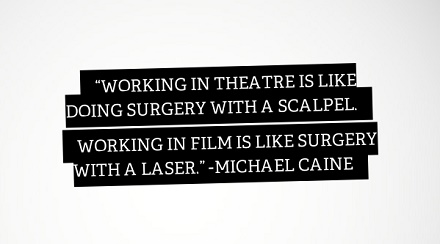Stage actors worry they’ll be “too big” on camera. Often their solution is give small, whispered, lifeless performances lacking feeling, intention and point of view. That’s the exact opposite of every great film performance I’ve ever seen. Great performances come in all shapes and sizes. What they have in common is that they are all intensely human and humanity can be loud, obnoxious, aggressive, dance on the ceiling happy, heartbreakingly funny or shamelessly stupid. The camera handles larger than life-sized performances beautifully – as long as they’re genuine.
Acting is acting in both mediums. The moment to moment work is the same. You must know where you come from, who you are physically and emotionally, what your specific, personal relationships are to the people you encounter and talk about, what your dream is and what you are willing to do to get it, etc.
The differences are technical. Knowing the parameters of the size of frame you’re working in is just like adjusting your physicality to the size of the house you’re playing in live theatre. You don’t work 100 seat house like you would a 3,000 seat house and you don’t work a close-up like you’re in a long shot. Oscar-winning actor, Michael Caine, describes it this way: “Working in theatre is like doing surgery with a scalpel. Working in film is like surgery with a laser.” On camera you only have to say “I love you” to the person right in front of you and they shouldn’t hear you in the back row. That would be weird. It’s just you and your scene partner in the room and nothing else exists.

.
Work with a video camera to see what you look like in a close up, medium and long shot. These are the new “houses” you’ll be playing to on set. Are you simply listening and responding, letting your scene partner’s words affect you, or are you just “acting” like you are? Identify your physical habits. Are you a blinker? An eyebrow raiser? Are these appropriate to what you’re playing? Do they strengthen or weaken you? Michael Chekhov said “An actor has to burn inside with an outer ease.” It’s perfect advice for acting on camera. Please don’t leave your heart and your passion at the door when you step on set.
.
Let me know your thoughts and questions down below… I’d love to hear from you!
.
[feature_box style=”8″ only_advanced=”There%20are%20no%20title%20options%20for%20the%20choosen%20style” content_font_size=”20″ alignment=”center”]
Sign up HERE to have my acting & audition tips sent directly to your inbox! To say thanks I’ll send you my ebook “The 6 Secrets of a Working Actor”
[/feature_box]
.
All my best,
Philip
.
Philip Hernandez is a respected acting teacher and singing coach in NYC. He is also the only actor in Broadway history to play both Jean Valjean and Inspector Javert in Les Miserables. He created principal roles in Broadway’s Kiss of the Spiderwoman and Paul Simon’s The Capeman. You may also know him from his many television appearances: The Blacklist, Gotham, Blue Bloods, The Path, Bull, Nurse Jackie, Elementary, Person of Interest, Law and Order, Hostages and Damages to name a few. For information about acting lessons CLICK HERE or singing lessons CLICK HERE.
Follow him on twitter @philip24601, on Instagram @philip24601 and on Facebook at @philip24601.